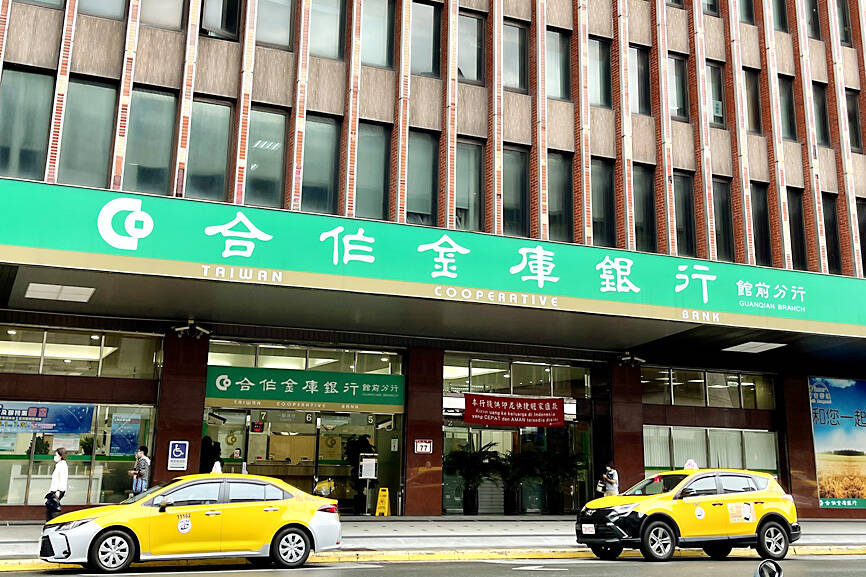Taiwan Cooperative Financial Holding Co (合庫金控) and Hua Nan Financial Holding Co (華南金控) are looking at stable profit growth this quarter, after reporting robust earnings in the first three quarters.
The two state-run bank-focused conglomerates shared cautious optimism with investors amid stable GDP growth at home and rising uncertainty linked to US president-elect Donald Trump’s vow to add tariffs on all imports.
“We aim to grow profit in a stable fashion going forward, as local firms would continue to benefit from the artificial intelligence boom and the world’s economy would gain a bit more momentum next year,” Taiwan Cooperative Financial president Su Tso-cheng (蘇佐政) told an online investors’ conference yesterday, citing the IMF.

Photo: George Tsorng, Taipei Times
However, the US Federal Reserve is likely to slow interest rate cuts, considering healthy economic data and inflation expectations ahead, Su said, adding that the US labor market and private consumption fared resilient.
The US is the world’s largest end market of consumer electronic gadgets whose critical components are made in Taiwan.
Europe and China would put up a lackluster performance amid rising protectionism and geopolitical tensions, Taiwan Cooperative Financial said.
Net income at Taiwan Cooperative Financial picked up 8.24 percent year-on-year to NT$16.23 billion (US$498.7 million) in the first three quarters, or earnings per share of NT$1.04.
Main subsidiary Taiwan Cooperative Bank (合作金庫銀行) generated NT$15.56 billion, suggesting a 10 percent pickup from a year earlier and driving 95.87 percent of overall earnings, company data showed.
Foreign exchange swap gains were about NT$9.2 billion in the first three quarters and would surpass the NT$10 million mark for the whole of this year, the bank said.
The amount could slow next year if the Fed lowers interest rates and narrows the interest gap between the US dollar and the NT dollar, it said.
Its branches in the US and Hong Kong reported active lending activity, compared with China and Cambodia, it said, adding that it remains to be seen if things would improve next year depending on how China’s stimulus measures pan out.
Hua Nan Financial made similar observations on Wednesday, after posting record-high profit of NT$17.5 billion in the first nine months, or earnings per share of NT$1.3.
The company said it is closely monitoring the Trump effect, which has already fueled volatility in bond and foreign exchange markets.
As of yesterday, the NT dollar weakened 1.8 percent against the greenback and the local bourse shed 2.4 percent since the US presidential election on Nov. 5.
Morgan Stanley said recently that stiffer tariffs would shake export-reliant economies such as Taiwan and South Korea harder.
Taiwan’s central bank might cut interest rates next year to support the economy, Hua Nan Financial said.
Hua Nan Financial and Taiwan Cooperative Financial expect their mortgage operations to subdue next year, as a result of central bank’s credit control measures introduced in September.

Taiwan’s long-term economic competitiveness will hinge not only on national champions like Taiwan Semiconductor Manufacturing Co. (TSMC, 台積電) but also on the widespread adoption of artificial intelligence (AI) and other emerging technologies, a US-based scholar has said. At a lecture in Taipei on Tuesday, Jeffrey Ding, assistant professor of political science at the George Washington University and author of "Technology and the Rise of Great Powers," argued that historical experience shows that general-purpose technologies (GPTs) — such as electricity, computers and now AI — shape long-term economic advantages through their diffusion across the broader economy. "What really matters is not who pioneers

In a high-security Shenzhen laboratory, Chinese scientists have built what Washington has spent years trying to prevent: a prototype of a machine capable of producing the cutting-edge semiconductor chips that power artificial intelligence (AI), smartphones and weapons central to Western military dominance, Reuters has learned. Completed early this year and undergoing testing, the prototype fills nearly an entire factory floor. It was built by a team of former engineers from Dutch semiconductor giant ASML who reverse-engineered the company’s extreme ultraviolet lithography (EUV) machines, according to two people with knowledge of the project. EUV machines sit at the heart of a technological Cold

TAIWAN VALUE CHAIN: Foxtron is to fully own Luxgen following the transaction and it plans to launch a new electric model, the Foxtron Bria, in Taiwan next year Yulon Motor Co (裕隆汽車) yesterday said that its board of directors approved the disposal of its electric vehicle (EV) unit, Luxgen Motor Co (納智捷汽車), to Foxtron Vehicle Technologies Co (鴻華先進) for NT$787.6 million (US$24.98 million). Foxtron, a half-half joint venture between Yulon affiliate Hua-Chuang Automobile Information Technical Center Co (華創車電) and Hon Hai Precision Industry Co (鴻海精密), expects to wrap up the deal in the first quarter of next year. Foxtron would fully own Luxgen following the transaction, including five car distributing companies, outlets and all employees. The deal is subject to the approval of the Fair Trade Commission, Foxtron said. “Foxtron will be

INFLATION CONSIDERATION: The BOJ governor said that it would ‘keep making appropriate decisions’ and would adjust depending on the economy and prices The Bank of Japan (BOJ) yesterday raised its benchmark interest rate to the highest in 30 years and said more increases are in the pipeline if conditions allow, in a sign of growing conviction that it can attain the stable inflation target it has pursued for more than a decade. Bank of Japan Governor Kazuo Ueda’s policy board increased the rate by 0.2 percentage points to 0.75 percent, in a unanimous decision, the bank said in a statement. The central bank cited the rising likelihood of its economic outlook being realized. The rate change was expected by all 50 economists surveyed by Bloomberg. The